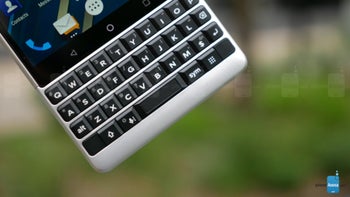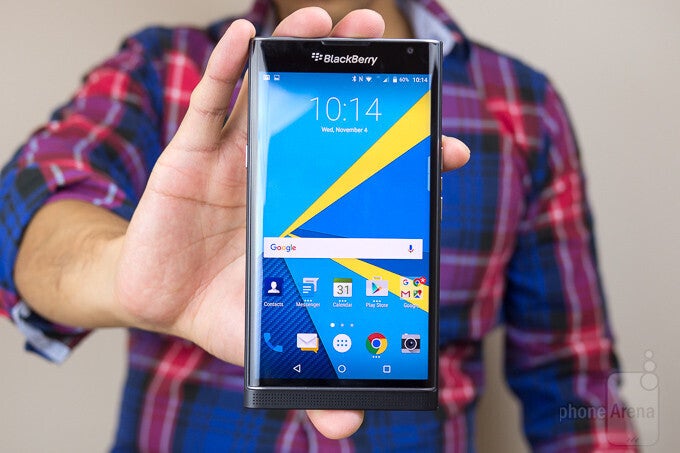BlackBerry pulls license from OutwardMobility killing hopes for a 5G 'Berry

Two years ago, BlackBerry fans were devastated after TCL, the company that licensed the BlackBerry name and produced several models including the KEYOne and KEY2, announced that it would allow its license with BlackBerry to expire on August 31, 2020. But just days before TCL's license was to expire, BlackBerry fans' prayers seemingly were answered.
On August 19, 2020, a company called OnwardMobility partnered up with Foxconn's FIH Mobile Limited to announce that they would release a new BlackBerry phone in 2021. Not only would this be the first 'Berry to support 5G, it also would keep the physical keyboard which had been synonymous with the BlackBerry name. While not all BlackBerry phones had such a feature, the vast majority of them did.
BlackBerry cancels OutwardMobility's license and sells off its mobile patents
While OnwardMobility announced the hiring of a European business head and a director of government sales a year ago, by the time the ball dropped in Times Square to usher in the New Year, the bottom line was that 2021 came and went without a new BlackBerry model announced. While the company kept promising that a new 5G BlackBerry was still coming, the project is now dead.

According to sources, OnwardMobility's 5G BlackBerry took its design cues from the Priv
According to Kevin Michaluk, founder of CrackBerry (which has rebooted), and Android Police, the 5G BlackBerry project has been killed off. And BlackBerry has revoked the license that it had given the OnwardMobility team. BlackBerry itself doesn't appear too keen to revisit those earlier days when it was a smartphone manufacturer, especially after it just concluded a fire sale for its remaining mobile patents (for which it received $600 million).
The end of the line for BlackBerry started on that fateful January day in 2007 at Macworld when the late Steve Jobs held the touchscreen Apple iPhone aloft in front of a captivated audience. It is not a reach to say that the world changed on that very day. Since the iPhone was exclusive to AT&T at that time, Verizon was extremely open to an iPhone challenger from BlackBerry.
The BlackBerry Storm was the Canadian company's first touchscreen phone and offered a unique twist; tapping on the screen would allow the glass to depress slightly mimicking the feeling of tapping on a real keyboard. In late 2008, the device was launched and was quickly panned. BlackBerry had failed to place enough sensors to cover all of the QWERTY causing issues when typing.
While it was a big seller for Verizon, almost every unit (including mine) had to be returned for repair. Sadly, the sequel was produced correctly and might have been a big hit if not for the Motorola DROID and Android. Over the subsequent years, BlackBerry tried to compete with the big names like Apple and Samsung, and even replaced BlackBerryOS with Android to keep a freezer full of popular apps.
The chances of seeing a 5G BlackBerry are practically nil
Eventually, the company gave up and sold a license to TCL allowing the electronics manufacturer to produce phones under the BlackBerry name. Early in 2017, it appeared that TCL had delivered a competitive BlackBerry phone with a physical keyboard when the KEYone was launched. Not only did it have the physical QWERTY, but it also had outstanding battery life as well, another tradition from the early days.
The KEYone made our list of the most underrated handsets for 2017, but at the end of the day, only 850,000 BlackBerry devices shipped that year according to IDC. TCL tried it again with the BlackBerry KEY2. Despite tweaks made to the device (including an improved keyboard), the device was not a big seller. And the last straw was the BlackBerry KEY2 LE, a less expensive model of the KEY2 with stripped-down specs including 33% less memory and a less powerful chip.
Those in the know say that OnwardMobility's 5G BlackBerry was designed to resemble the Priv. That was the first Android-powered 'Berry and was the last one produced by BlackBerry before it decided to license its iconic name. It featured a slide-out QWERTY keyboard.
Again, based on information revealed by sources, BlackBerry gets most of the blame for shutting down the project because it pulled its license from OnwardMobility. Besides the supply-chain shortage, CEO John Chen's decision not to put the BlackBerry name on another phone was perhaps the major reason why the project was canceled.
Now that the company has sold off its mobile patents, the chances of seeing a 5G BlackBerry handset are close to nil. And if we can riff on Freeda Payne's song Band of Gold, all that's left of BlackBerry is a Bag of Gold.










Things that are NOT allowed: